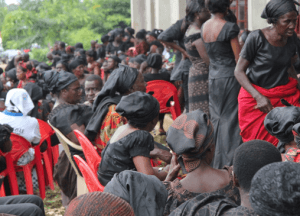Communities in Upper East modify burial and funeral practices
 Traditional rulers trained by the Ghana Health Service (GHS) on Ebola and Cholera prevention have begun modifying some of the negative cultural practices that can lead to the outbreak of such diseases.
Traditional rulers trained by the Ghana Health Service (GHS) on Ebola and Cholera prevention have begun modifying some of the negative cultural practices that can lead to the outbreak of such diseases.
Among some of the negative cultural practices that can spread the Ebola virus and Cholera and other related diseases is the way and manner some of the communities handle corpses. Many households keep corpses from two to five days whilst they perform certain rituals before burial.
It would be recalled that last year, during the emergence of Ebola and Cholera, the Institute of Social Research and Development (ISRAD), a non- profit local organization, which supported the training, undertook a number of activities to raise awareness on the signs and symptoms, the mode of transmission and preventive measures on the two diseases.
Some of the activities undertaken at the various districts included capacity building and orientation of traditional and religious leaders, training of community health surveillance volunteers, house to house sensitization, in-school sensitization programmes, and dawn to dusk sensitization and community durbars.
Speaking in an interview with the Media at separate functions, some of the Traditional rulers said with the knowledge acquired on the Ebola virus and Cholera, they have decided to initiate moves to prevent any eventuality in their communities.
Naba Baba Salifu Aleemyaarum, Paramount Chief of the Bongo Traditional Area, said a directive had been issued by the Traditional Council that no corpse should be kept for more than one day without burial.
“Those who have the penchant of keeping corpses in their houses for a number of days have been advised to arrange to do that with the hospital for such corpses to be kept in the morgue pending the burial”.
The Bongo Traditional Council, he noted, had also sensitized the community members on the signs and symptoms of the diseases and had given directives that anybody suspected of having the Ebola virus be sent to the health facility.
The Chief of Kazugu-Buru in the Kassena Nankana West District, Pe Parekuri Thomas Aluah, who commended the NGO for the capacity building workshop, said through a number of durbars organized by his outfit, a lot of cultural practices that impeded on health had either been modified or abolished.
He cited for instance that the community was advised to modify the way and manner certain social events such as parties, funerals and burials services were performed in order to reduce risk of spreading diseases.
“In my traditional area apart from stopping people from keeping corpses for a number of days before burial, local funeral managers, who handle corpses with their bare hands, had been told to stop the practice and this is being monitored and checked to ensure that they adhere to rules instituted by the traditional council.
The undertakers including all community members are also taught to cultivate the habit of thoroughly washing hands and cloths with soap and water after any such activity”
The Executive Director of ISRAD, Dr Mawiya Zakaria, noted that the geographical position of Ghana in the sub region, coupled with some cultural practices like shaking of hands and the burying of the dead, among others, exposed the country to Ebola.
He said it was against that backdrop that his outfit, with funding from UKAID was complementing the efforts of government to see how the Ebola virus and Cholera could be prevented.
Source: GNA
